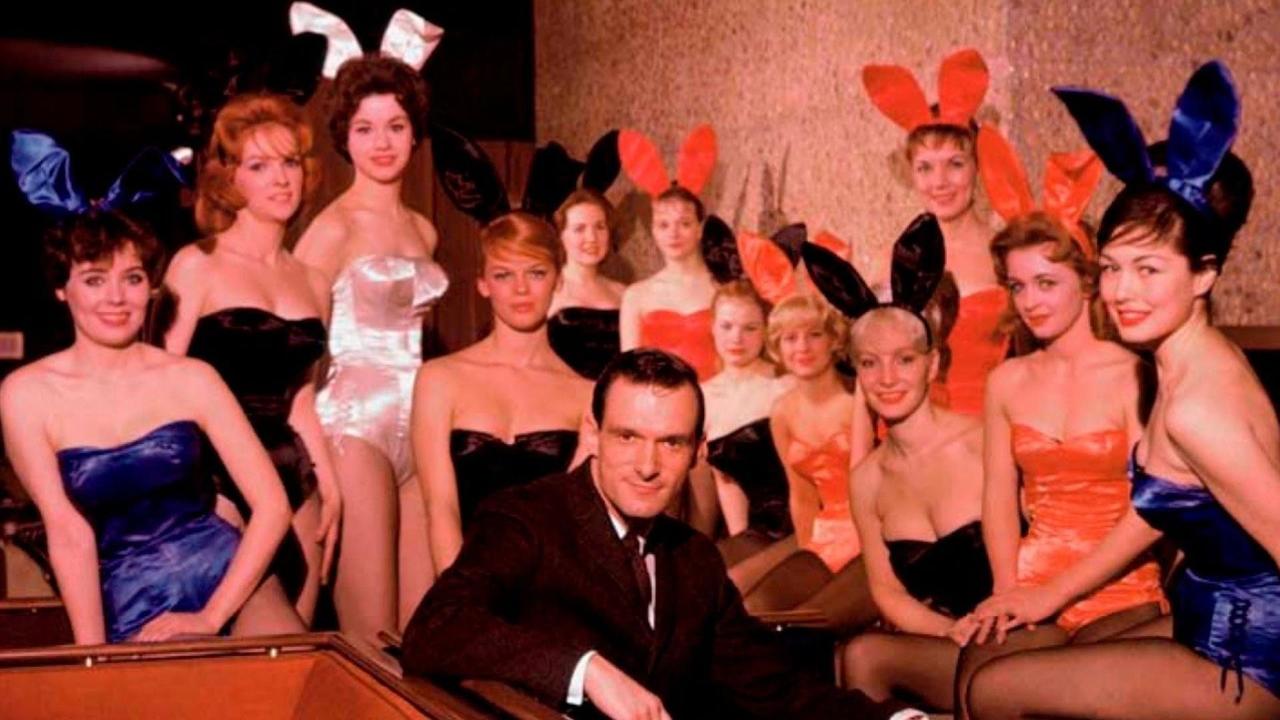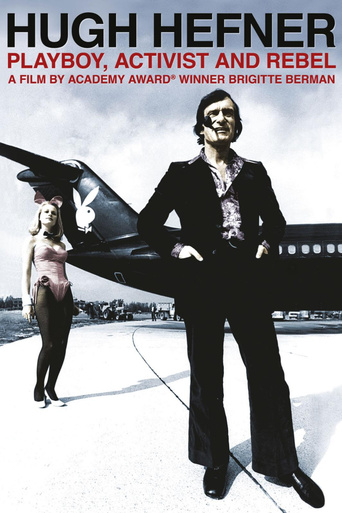

Far from Perfect, Far from Terrible
... View MoreVery interesting film. Was caught on the premise when seeing the trailer but unsure as to what the outcome would be for the showing. As it turns out, it was a very good film.
... View MoreIt's the kind of movie you'll want to see a second time with someone who hasn't seen it yet, to remember what it was like to watch it for the first time.
... View MoreMostly, the movie is committed to the value of a good time.
... View MoreWe are all very familiar with the iconic brand that is the Playboy bunny. We are also familiar with the image of Hugh Hefner: An ancient Lothario; mannequin for a smoking jacket; pipe, and gallons of young, beautiful women, adoring him, as in the "reality-TV" horror that was The Girls of the Playboy Mansion. Some are unaware of his many political activities that he was involved in, in each decade since the 1950's. His involvement with the breaking of many socially draconian taboos and laws of sex, sexuality and the representation of these: Freedom of press and speech: The civil-rights movement: The anti Vietnam protesters of the late 1960's and early '70's: The Reaganomics of the 1980's and it's religious-extremist attitude towards "pornography". Hefner, according to this film, was active (if not systematic) in all of these 'historical' events that have instigated social change, not only in America, but throughout the western world. Perhaps this statement is too strong.This documentary, directed by Brigitte Berman (who had previously made the Academy award winning film, Artie Shaw: Time is All You've Got (1986)), tells the story of Hefner, not just as a magazine producer, but as a political activist. beginning with the publication of the magazine Playboy, the film charts Hefner's rise as an advocate of literature and for political polemics, published in a monthly men's paper that also riskily showed the naked female forms. Alongside the playmate-of-the-month's and centre-fold's there contained abridged, monthly sections of books by such writers as Ray Bradbury and Ian Fleming; interviews with political activists/thinkers such as Dr Martin Luther King Jr and Malcom X. The magazine was breaking taboos set by a repressive society. Historically Hefner was also embroiled in the HUAC (House UnAmerican Activities Committee), who's McCarthyism was seen as a dent in America's freedom and an infringement of the first amendment. We also discover that Hefner supported Lenny Bruce (at a time when it was seen as career suicide to do so) through his trials for obscenities on stage.Whilst the film focuses on these more flattering aspects of Hefner's life, it does skirt around many issues thrown at him by groups against his "objectification" of women. It does not fully explore the feminist and journalistic backlash that was aimed at him. I felt the film would benefit by exploring these issues, and present a less biased (less Hefner-centric) argument in the film, and it's issues of (particularly) sex and sexuality and all its representations. The film uses some very bizarre talking heads: Gene Simmons (well I guess he's probably met him, and probably reads Playboy) and George Lucas?? Hang on a minute! (Lucas oozes about as much sexuality as a brick oozes Virgina's). Aside from a few under-explored avenues of Hefner's career, this is still a flawed but entertaining documentary. We are shown that Hefner is not myopic in his outlook. He has been politically active and has given to many worthy causes. But, as he now is (seen by millions on reality TV), we just see an old man still unable to be monogamous, and surrounding himself in fresh, young girls, which are pushed aside annually for new meat. (Am I criticising that? Pfft!).www.the-wrath-of-blog.blogspot.com
... View MoreLove it or hate it, Playboy magazine changed the way people in America viewed sex and sexuality. Certainly, it objectified women, but they were not alone in doing so. Advertising has done an excellent job of that through the years.But, Hugh Hefner was a lot more than a magazine. He was an entertainer that did more to promote jazz than anyone I know. He was also a man who did more to promote equality among the races that most anyone in America.Entertainment was prime with Hefner, but his social activism against those, like Gene McCarthy and Charles Keating, who would impose their particular brand of morality on others.He was at the forefront of women's issues, racial issues, free speech issues and more.One of a kind and a fascinating man to listen to.
... View MoreIf you've read "Playboy" you know that it's more than a T@A magazine clearly after reading one can say it's thought provoking and it makes one think. As many articles are one's fighting for freedom and expressing opinions of social, economic, political, and values of advice. Really the magazine educates you and in the meantime your always treated to photos of beautiful ladies. And in a way this doc is a treat as it tells the history of the Playboy empire and showcases the founder the interesting and culture crusader activist Hugh Hefner.From rare vintage footage of Hef's early days growing up director Brigitte Berman shows how eager and hard working that Hef was to express his viewpoints from an early age. From then after a stint at Esquire he with the help of some family money put up his own new magazine titled "Playboy". At first in the mid 50's a very controversial time Hefner had to blend the magazine with art, stories of fiction and advice to take away from the nude photos of beautiful women.Yet thru out this doc in interviews with Hef and many others you hear how it wasn't an exploitation of women, but more of an experience of freedom and sexual rights for both men and women. And of course all of that came under attack from the religious right and extreme feminists. Even thru it all Hefner has been under investigation from the federal government yet Hef always fought on winning his court cases proving his photos and literature was often satire.Hef proved as Playboy expanded his launch was super by putting in clubs even having his own jet as the mansion moved from the Windy city to Hollywood, California fun in the sun! Always surrounded with beautiful playmates, and fun and games plus movie night(Hef's a film buff) and lingerie parties! In the meantime on his show "Playboy After Dark" Hefner fought for human rights taking on racial issues and the right to freedom of speech as Hef and his performers always took a provocative stance. And Hugh was always the man very flamboyant by dressing in his signature silk robes.Real treats on this doc are the clips and interviews from his friends, and well known people like Tony Bennet, Pat Boone, Dick Cavett, George Lucas, Jesse Jackson, Bill Maher, Jenny McCarthy, Gene Simmons, and Shannon Tweed. All spoke highly of their friend. Really this doc is revealing it traces the whole history of the Playboy empire.Clearly Hugh Hefner was an extraordinary pop culture icon who spoke for freedom especially he encouraged individuals to feel good about sexual pleasure and to challenge authority and don't be a yes man always question things and think as life is often thoughtful and provocative not only under the sheets, but the world around is interesting too with it's social, political, and economic climates. Hugh Hefner will always be a living legend that changed life, culture, and a person's way of thought as one no longer had to feel dirty about sex, as "Playboy" made it an enjoyable pleasure of individualism and a great expression of feel good freedom. This doc really stands up to it's name Hugh Hefner certainly is a true rebel and activist.
... View MoreI attended the New York premiere of this film at MOMA on Mar. 18, 2010. In attendance were Dick Cavett, Tony Bennett, Barry Melton of Cowboy Joe and the Fish, Christie Hefner among other interviewees who appeared in the film. Sadly, as one of the curators remarked, the "comps" outnumbered the general public.Director Brigitte Berman has directed over 100 short docs for Canadian TV. She met Hefner while researching her Bix Beiderbecke biopic. Hefner, she realized, was more than a mere pornographer. The Playboy founder agreed at once to give Berman unfettered access to his archives and complete artistic control of the project.A remarkable aspect of this film is the showcasing of the outstanding entertainers Hefner featured on his two syndicated TV shows. Pete Seeger and Lenny Bruce made rare TV appearances for Hefner in the late '50's while they were still blacklisted by the 3 major networks. Comedian and activist Dick Gregory got his start working in the Playboy key clubs. And Hefner was among the first producers to show integrated musical acts on TV.To her credit, Berman gives time to critics of Hefner's "Playboy Philosophy." Christian devotee Pat Boone and feminist icon Susan Brownmiller get to express their misgivings with Hefner. (Onetime Playboy bunny and feminist Gloria Steinem declined to be interviewed.) It's clear, however, whose side Ms. Berman is on.Unfortunately, not enough time is devoted to the tragic death of Dorothy Stratten. After the screening, I asked the director if she had approached Stratten's intended, Peter Bogdanovich. Ms. Berman said she had not. She explained that so much had already been aired publicly about this sad affair that it would take off and derail her film if she pursued it in depth. Still, to include it solely to "explain" Hefner's subsequent mild stroke seems inadequate.Berman said her first rough cut was over seven hours and she worked hard to trim it to about two. In my view the film is too short. There was nary a mention of Hefner's career as a film producer. (Playboy Enterprises produced Roman Polanski's "Macbeth", one of the finest Shakespearean films ever made.)But she hinted that the DVD would have plenty of extras to satisfy completists like me.This film will have a limited US release in NY and LA this summer and undoubtedly end up on PBS and other networks. Hugh Hefner, like him or not, is a major figure in 20th Century American cultural history, and this film is not to be missed. Highly recommended.
... View More